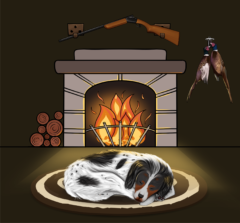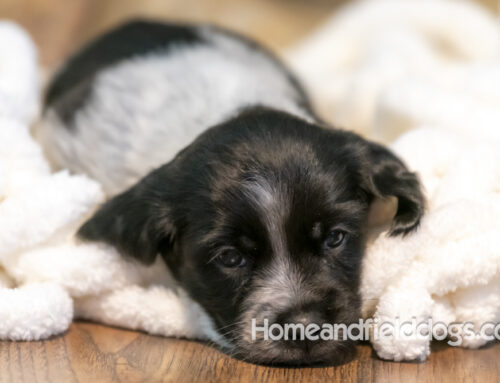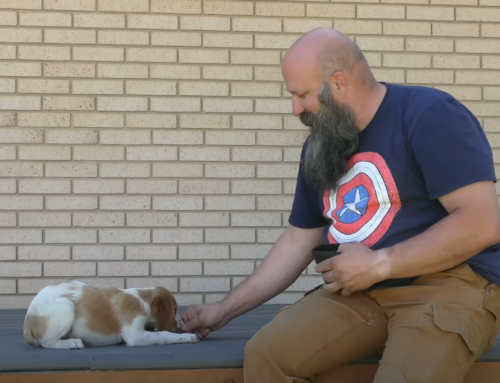Proper socialization is the single most important thing you can do with your puppy in order to have a happy, well-adjusted and stable dog who is both a beloved family member and a confident worker in the field. But while we want to expose our puppies to as many novel experiences as possible, we have to balance that exposure with the risk of potential exposure to diseases before they are fully vaccinated. It is a fine line that must be carefully managed.
Your puppy’s socialization process started well before he or she joined your family, as each pup is exposed to different textures, smells, sounds and (appropriately sanitized) people while still in the whelping box. Once he goes to live in your home, what experiences should your puppy encounter to continue the socialization process? Simply put, the more situations they are safely exposed to as puppies, the more confident and happy they will be as adult dogs. Car rides, kennels, walks, textures underfoot, unique sights, sounds and smells: the more your puppy is exposed to, the better he will handle new situations in the future.
Accomplishing appropriate socialization must be balanced against the risk of communicable diseases. While your puppy’s vaccination status is current when he goes home with you, he will need a series of booster vaccinations every 3-4 weeks until he is at least 16 weeks old. He will not be fully protected until a week after that final vaccination is given. So how to minimize the risk of disease exposure with the need to socialize in public places?
Puppy obedience classes are fantastic for puppy socialization, but in my opinion are generally ineffective for puppy actual training. Most trainers require puppies to be appropriately vaccinated for their age to attend class (and if they don’t DO NOT TAKE YOUR PUPPY!). For this reason I consider these classes to be an excellent source of socialization as there’s much less chance of your puppy being exposed to a puppy with a contagious disease. The actual training that occurs in these classes can vary greatly as there is little oversight over dog training (anyone can call themselves a “trainer”) but the socialization opportunities are priceless. It is important that you keep this end goal in mind and not seek to overly “train” at this age, as while we want control, we don’t want to squash drive in a future hunting dog. Electric, pinch or choke collars should never be used in a puppy class, and while I personally train using motivational methods, I also avoid the excessive use of treats as weaning them off the dependency of food can be challenging.
My absolute favorite puppy classes are taught by instructors associated with Dr. Ian Dunbar’s Sirius puppy training program. I have been fortunate to spend time with Dr. Dunbar on a one-to-one basis, and can attest that he has a real understanding of dog psychology and how to most effectively train puppies from the start. If you can find a Sirius course near you that is the best investment you can make for your puppy’s future.
Another recommendation, regardless of the puppy class you’re able to attend, is to download and read the book “After You Get Your Puppy” from https://dogstardaily.com/training/after-you-get-your-puppy . Amazingly, this book is 100% free and contains critical information about starting your puppy off on the right foot. If you’re interested in good training videos, the same site has some of the best training videos I’ve ever seen: go to https://www.dogstardaily.com/videos .
There are also some safe public places in which your puppy can experience new situations: most Home Depot and Lowe’s stores allow dogs, yet typically a visit there can be done without direct exposure to any other animals. Dog parks, big box pet stores and other areas where there is a large concentration of unknown dogs should be avoided until your pup’s vaccination series is complete. Have a friend with a vaccinated puppy? Having a few “puppy parties” in which you alternate going to their home and them coming to yours is a great way for your pup to safely learn about interacting with other dogs.
You will find many options for puppy training and selecting the right program will set you up for success. If you’re considering a class, ask to observe one before signing up: make sure the trainer is using methods that are not coercive and that you are comfortable with. Of course I’m always available to help





Leave A Comment